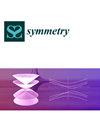舱室-索-塔系统的风致振动及阵风响应系数
IF 2.2
3区 综合性期刊
Q2 MULTIDISCIPLINARY SCIENCES
引用次数: 0
摘要
大型射电天文望远镜是一个典型的复杂耦合系统,由馈源舱、电缆和支撑结构组成。系统对风荷载极为敏感,尤其是进料舱,在运行过程中对振动位移有很高的要求,过大的振动可能会影响正常运行。为了研究这类耦合系统的风致振动特性,本研究以500米口径球面射电望远镜(FAST)为例进行研究。首先,建立了FAST的精细化有限元模型,并进行了模拟随机风荷载的动力分析。特别考虑了电缆边界对馈电舱时频域响应的影响。然后,计算了耦合系统中不同结构构件的阵风响应因子(GRF)。最后,通过参数分析揭示了不同风速和风向下GRF的演化规律。由于FAST为对称结构,故参数分析只考虑0°~ 60°风向范围。结果表明:在北风作用下,进料舱的转动和平动位移有明显的差异,特别是在东西方向上的差异较大;在考虑支撑塔的情况下,低频范围内进料舱功率谱密度(PSD)没有变化。然而,在高频范围内,考虑支承塔会导致PSD增加,并且在支承塔一阶固有频率附近产生共振。与设计规范相比,基于动态响应的GRF存在较大偏差,这突出表明在确定此类耦合系统的GRF时需要进行独立分析。本文章由计算机程序翻译,如有差异,请以英文原文为准。
Wind-Induced Vibrations and Gust Response Factors of the Cabin–Cable–Tower System
A large-scale radio astronomical telescope is a typical complex coupled system, consisting of a feed cabin, cables, and supporting structures. The system is extremely sensitive to wind loads, especially the feed cabin, which has high requirements for vibration displacement during operation, and excessive vibration may affect normal operation. To investigate the wind-induced vibration characteristics of such coupled systems, this study takes the Five-hundred-meter Aperture Spherical Radio Telescope (FAST) as an example to conduct research. First, a refined finite element model of FAST is established, and a dynamic analysis using simulated random wind loads is conducted. The influence of the cable boundary on the time–frequency domain responses of the feed cabin is particularly considered. Then, the gust response factor (GRF) for different structural components within the coupled system is calculated. Finally, the evolution law of the GRF under various wind speeds and directions is revealed by parametric analysis. The parameter analysis only considers the wind directions ranging from 0° to 60°, because FAST is a symmetric structure. The results indicate that obvious differences are observed in both the rotational and translational displacements of the feed cabin under northward wind, especially the results along the east–west axis. When the supporting towers are considered, there is no change in the power spectral density (PSD) of the feed cabin in the low-frequency range. However, in the high-frequency range, taking the supporting towers into account leads to an increase in PSD and a resonance near the first-order natural frequency of the supporting tower. The GRF based on the dynamic response exhibits substantial deviations compared to those obtained from design codes, highlighting the need for an independent analysis when determining GRF for such coupled systems.
求助全文
通过发布文献求助,成功后即可免费获取论文全文。
去求助
来源期刊

Symmetry-Basel
MULTIDISCIPLINARY SCIENCES-
CiteScore
5.40
自引率
11.10%
发文量
2276
审稿时长
14.88 days
期刊介绍:
Symmetry (ISSN 2073-8994), an international and interdisciplinary scientific journal, publishes reviews, regular research papers and short notes. Our aim is to encourage scientists to publish their experimental and theoretical research in as much detail as possible. There is no restriction on the length of the papers. Full experimental and/or methodical details must be provided, so that results can be reproduced.
 求助内容:
求助内容: 应助结果提醒方式:
应助结果提醒方式:


